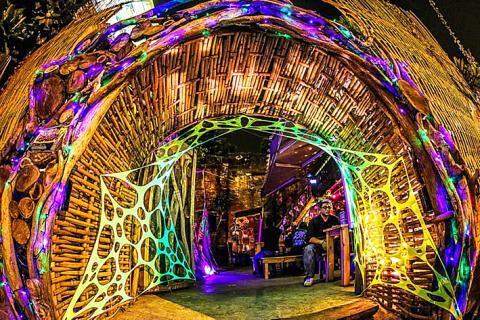Tainan has seen its fair share of invading forces, from the buccaneer Dutch through to the expansionist Japanese. But few of the visitors to this southern city are as eccentric as 41-year-old Oklahoma native Darin Starkey.
The wild-eyed proprietor of Tin Pan Alley, a bar-cum-diner-cum-nightclub, who set out for Taiwan in August 1997 after reading in a guidebook that the country loved loud sounds.
“I didn’t realize they meant firecrackers rather than music,” said Starkey, a self-professed graduate of the “University of Psychedelicatessen.”

Photo courtesy of Oscar Sun
“But within six months of arriving [in Taiwan], I fell in love with the place and I knew that I was probably going to be here for the rest of my life.”
DRIFTIN AND DRIFTIN
After drifting from enterprise to enterprise during the tail end of Taiwan’s economic boom, Starkey eventually realized his childhood dream of opening a western-themed restaurant in Taichung. He called it Papa’s and imagined it as something out of a movie.

Photo: Sam Sky Wild
However, the magic of the silver screen failed to project itself into the real world and the eatery closed a year later.
Starkey and his Taiwanese wife Terra, then based in Taipei, hit the road once more and took the food with them to Tainan.
A disused lot on the city’s Beimen Road, a stone’s throw from Tainan’s historic art deco-inspired railway station, provided the unlikely base for Starkey’s next — and current — venture, Tin Pan Alley.

Photo: Sam Sky Wild
Starkey and his father, who traveled from the US to help out, built the venue — named in honor of the fabled New York music scene — from scratch.
Since then, Tin Pan Alley has become the venue of choice for many leading expat DJs operating out of Taiwan, including UK break-beat expert DJ Two Hands and the eclectic Russian re-mixer DJ Lyova Lyubov.
Increasingly Taiwanese bands and DJs are performing at the venue and proprietor Darin Starkey has his eyes on change.

Photo courtesy of Theo Chamber Cox
While heavy industry may have helped Tainan motor through several decades of development, the city is increasingly turning its attention to tourism and its wealth of ancient temples and colonial-era ruins are helping draw the crowds.
CULTURAL HUB
A Tainan City Government report into the city’s finances stated that “in 2010 there were 3.5 million tourist visitors to the city.” Part of a nationwide trend, the city is continuing to see increasing visitor numbers and many regard it the nation’s key cultural hub.
“The international community is increasingly happening here and we are hoping that Taiwan can represent itself more in that mix,” Starkey said.
DJ Chambers, originally from Somerset, England, headlines tonight and Friday where he will be spinning a fusion of drum and bass, hip-hop, nu-funk, reggae and house.
FLEXIBILITY
The DJ and producer, who also moonlights as a host at International Community Radio Taipei (ICRT), is squeezing in a last show at Tin Pan Alley before he jets off for a series of gigs in Europe, including a slot at the hugely popular Leftfield Glastonbury festival in the UK.
“Tin Pan Alley … allows total freedom and flexibility in terms of which styles of music to play … With my DJ sets, I try to play as broad a range as I feel I can get away with,” says Chambers.
The 24-year-old Chambers, who professes to have fallen in love with Taiwan after moving to fill a residency slot at the Brickyard in Kaohsiung in 2010, says the country’s west coast is now home while he manages to travel to dates within Asia.
The free-wheeling DJ is followed on June 12 by veteran US expat DJ Louis (real name Louis Horsiley).
Louis, who originally moved to Taiwan in 1969 and served at a military base in Tainan, is so widely recognized in the city now that some refer to him as the unofficial “mayor.”
The 68-year-old has spent a lifetime zig-zagging between Taiwan and the US but says he eventually chose Tainan to retire in because of its laid back vibe. However he confesses that the Chinese language still evades him: “I never learned to speak Chinese but I’m working on it — when you get my age it becomes hard.”
ALL INCLUSIVE
Starkey, who considers himself a Tainan local, attributes his quirky venue’s success to the fact that it remains open to new ideas and embraces inclusion.
“I’m an artist and I want artists to contribute to the place … I’ve said to people from the get-go: ‘You can do anything, you name it, it’s wide open to the community.’”
With Starkey’s second venture, the Tin Pan Diner, now only days away from opening it would appear that this globe-trotting backpacker’s days of journeying are over and, like those adventurers before him, he can now lay the foundations for a new empire.
Tin Pan Alley is located at 28, Beimen Rd Sec 2, Greater Tainan (台南市北門路二段28號), tel: (06) 223-1123. Admission is free on Wednesdays and NT$150 after 9pm on Fridays and includes one drink. Tickets can be purchased at the door. Facebook page: www.facebook.com/tinpanalleytaiwan

May 18 to May 24 Pastor Yang Hsu’s (楊煦) congregation was shocked upon seeing the land he chose to build his orphanage. It was surrounded by mountains on three sides, and the only way to access it was to cross a river by foot. The soil was poor due to runoff, and large rocks strewn across the plot prevented much from growing. In addition, there was no running water or electricity. But it was all Yang could afford. He and his Indigenous Atayal wife Lin Feng-ying (林鳳英) had already been caring for 24 orphans in their home, and they were in

On May 2, Chinese Nationalist Party (KMT) Chairman Eric Chu (朱立倫), at a meeting in support of Taipei city councilors at party headquarters, compared President William Lai (賴清德) to Hitler. Chu claimed that unlike any other democracy worldwide in history, no other leader was rooting out opposing parties like Lai and the Democratic Progressive Party (DPP). That his statements are wildly inaccurate was not the point. It was a rallying cry, not a history lesson. This was intentional to provoke the international diplomatic community into a response, which was promptly provided. Both the German and Israeli offices issued statements on Facebook

President William Lai (賴清德) yesterday delivered an address marking the first anniversary of his presidency. In the speech, Lai affirmed Taiwan’s global role in technology, trade and security. He announced economic and national security initiatives, and emphasized democratic values and cross-party cooperation. The following is the full text of his speech: Yesterday, outside of Beida Elementary School in New Taipei City’s Sanxia District (三峽), there was a major traffic accident that, sadly, claimed several lives and resulted in multiple injuries. The Executive Yuan immediately formed a task force, and last night I personally visited the victims in hospital. Central government agencies and the

Australia’s ABC last week published a piece on the recall campaign. The article emphasized the divisions in Taiwanese society and blamed the recall for worsening them. It quotes a supporter of the Taiwan People’s Party (TPP) as saying “I’m 43 years old, born and raised here, and I’ve never seen the country this divided in my entire life.” Apparently, as an adult, she slept through the post-election violence in 2000 and 2004 by the Chinese Nationalist Party (KMT), the veiled coup threats by the military when Chen Shui-bian (陳水扁) became president, the 2006 Red Shirt protests against him ginned up by